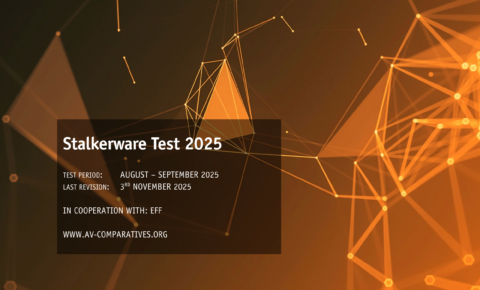Coalition Against Stalkerware’s Celebrates One Year Anniversary, Recognizes Milestones, New Members and UN’s International Day for the Elimination of Violence Against Women

The Coalition continues to grow membership to help combat issues of stalkerware
Today, the UN’s International Day for the Elimination of Violence Against Women also coincides closely with the Coalition Against Stalkerware’s one year anniversary. In its first year, the Coalition has more than doubled its membership, expanding both in geography and expertise in its partners including domestic violence advocacy and direct service organizations, IT security vendors, mobile security companies, privacy solutions providers, an association of technology journalists, and organizations focused on cyber safety.
For some years, the problem of stalkerware has been on the rise. Non-profit organizations are experiencing a growing number of survivors seeking help with the problem, and cybersecurity companies are detecting a consistent increase in these harmful applications. Launched in November 2019, the Coalition Against Stalkerware became an important organization dedicated to protecting consumers from abuse, stalking and harassment via commercially-available surveillance software.
Stalkerware programs enable an abuser to intrude into a person’s private life and can be used as a tool for abuse in cases of domestic violence and stalking. By installing these applications on a person’s device, abusers can get access to their victim’s messages, photos, social media, geolocation, audio or camera recordings (in some cases, this can be done in real-time). Such programs run hidden in the background, without a victim’s knowledge or consent.
Data from member organizations has shown a sharp rise in stalkerware apps in recent years.
- In 2019, Kaspersky detected a 67% year-on-year increase of stalkerware usage on its users’ mobile devices at a global level. The number of stalkerware installations worldwide during the first 10 months of 2020 (from January to October) totaled more than 48,500, which is close to the total (almost 52,000 installations) observed over the same period in 2019.
- According to Malwarebytes, while these apps have always presented a significant threat to users, the shelter-in-place orders that began taking effect in March 2020 resulted in a dramatic uptick in usage. Malwarebytes recorded a peak increase from January 1 to June 30, finding a 780 percent increase in monitor apps detections, and a 1,677 percent increase in spyware detections. Though detections waned starting in July, the numbers never dropped to their January levels. From January 1 to October 31, Malwarebytes recorded a 584 percent increase in monitor app detections, and a 1,044 percent increase in spyware detections. Overall, this represents more than 43,000 monitor app detections in the first 10 months of 2020.
- With Covid-19 spreading early 2020 and more and more countries going into lock-down to combat the pandemic F-Secure saw a significant increase in Stalkerware detections starting in March. While detections declined during early summer they shot up again towards the end of the holiday period and we noticed almost four times as many Stalkerware detections during August and September compared to the previous months. Cerberus is the most detected Stalkerware with 52 percent of the detections across unique mobile devices. Advertised as an anti-theft app it allows a stalker to hide on an Android device, prevent its deletion and also tracks the location of the device, takes pictures and screenshots as well as records audio.
- Additionally, a recent UK survey run by Certo Software shows that only 31% of people surveyed thought that spying on someone else’s phone was illegal.
With lockdowns which may be globally repeated due to the second wave of the COVID-19 pandemic, domestic violence incidents may be increasing again. Coalition partners from different territories reported increases in Spring 2020.
- In France, the Centre Hubertine Auclert explains that a third of organizations helping survivors have reported an increase of cyberviolence during the first lockdown (mostly cyberharassment and malicious calls). In a 2018 study on cyberviolence by intimate partners, the Centre Hubertine Auclert reported that 68% of women “felt they were experiencing surveillance or stalking at the hand of their partner or ex”.
- For India, the Cyber Peace Foundation refers to the National Commission for Women (NCW) reporting 587 complaints on their helpline number and online portal since the lockdown kicked into effect in March. Also, Cyber Peace Foundation states that 89% of the total number of cases registered to legal services authorities across the country were of domestic violence.
- Findings of the Second National Survey on technology abuse and domestic violence in Australia launched by WESNET with the assistance of Dr Delanie Woodlock and researchers from Curtin University, are that 99.3% of DV practitioners have clients experiencing technology-facilitated abuse and that the use of video cameras increased by 183.2% between 2015 and 2000.
The Coalition seeks to combine its partners’ expertise in domestic violence survivor support, digital rights advocacy, and cybersecurity to address the criminal behavior perpetrated by stalkerware and to raise general awareness about this important issue. European Institute for Gender Equality research shows that seven in ten women (70%) who have experienced cyber stalking, have also experienced at least one form of physical or/and sexual violence from an intimate partner.
Echoing words of the UN Secretary-General António Guterres who called gender violence ‘Shadow Pandemic’, members of the Coalition believe that we all have a role to play in recognizing the stealthy nature of stalkerware, the harmful impact that it has, and the need for collective action to support and assist individuals targeted by stalkerware.
During 2020, the Coalition partners have focused on raising greater awareness of stalkerware advocacy organizations, journalists, and regulators through public speeches, events, publications, research, and collecting the cybersecurity vendors’ data on stalkerware. The Coalition have also created a standard definition and detection criteria for stalkerware, which did not previously exist.
The Coalition’s plans for its second year include: outreach to individuals and organizations that can contribute to the stalkerware sample/metadata information sharing mechanism; additional data collection to inform evidence-based policymaking to respond to threats posed by stalkerware; series of assistance seminars to assist support organizations working with survivors of domestic violence and other individuals targeted by stalkerware; and further expansion of the Coalition to include additional organizations globally to assist in the mission of combating stalkerware and protecting individuals.
To find more about the organization’s activity, please visit the Coalition’s online resource. Users can find information about what stalkerware is, what it can do, how to detect it, and how to protect themselves in English, German, French, Italian, Spanish and Portuguese. For potentially affected users, the Coalition members recommend contacting local victim service organizations immediately.
Upcoming Coalition Against Stalkerware activities include:
- Webinar on the findings of the second national survey on technology abuse and domestic violence in Australia: 24 November 2020 (1pm AEDT) hosted by Wesnet. Register here: https://wesnet.org.au/members/webinars-events/
- The National Network to End Domestic Violence is partnering with Kering Foundation and Modern Films on 16 Days 16 Films, a short-film initiative to eliminate violence against women, push for change and accountability, and help combat gender inequality by creating opportunities for female filmmakers to have their stories seen.
- The European Network for the Work with Perpetrators of Domestic Violence (WWP EN), with support from Kaspersky, is launching the #ResponsibleTogether Campaign running until December 10. This includes on 25 November, the WWP EN kicking off the 2020 Responsible Together campaign aimed at spreading awareness on cyber-violence against women and girls. Find out more here
- On the last day of the 16 Days of Activism, on December 10, the Centre Hubertine Auclert and Kaspersky will organize a regional online event aimed at a French speaking audience to raise awareness about cyber violence and stalkerware. Please register here
“We are extremely proud to be part of the Coalition Against Stalkerware, and to see the results after one year of existence. The topic of stalkerware is now emerging, and fruitful discussions among private and public partners in the Coalition are allowing to better protect victims of domestic violence. We invite you to join our online event around the topic in French on December 10.”
Iman Karzabi, Project Manager for the Regional Observatory of Violence Against Women at Centre Hubertine Auclert
“The increasing prevalence of stalkerware in the environment should be a concern to everyone. These technologies can have frightening power over our lives that no person should ever wield.”
James Donaldson, CEO of Copperhead
“This is the first anniversary of the Coalition Against Stalkerware, and it has been quite a year in which we have learnt a lot. We now understand that stalkerware is not purely a technical problem. It’s not the IT part of the issue that is challenging, but the fact that we need to deal with the commercial availability of stalkerware, the lack of regulation around how it is being used and, perhaps the most difficult problem, the fact that violence against women and different forms of online abuse have been normalized. We can provide technical training on different forms of tech-enabled abuse for the NPOs, but it’s not enough – it should be complemented with a chapter focusing on and reflecting survivors’ psychological experiences“
Kristina Shingareva, Head of External Relations at Kaspersky
“Over the last year, we have made significant strides in educating the public about the growing dangers of stalkerware thanks to the incredible efforts of our partners. Sharing information and working together is critical to ensuring that we help reduce the dangers of apps that can be used to track people without their knowledge or consent. We hope more organizations join us as we continue to fight to ensure users can choose how and when to share their data with others.”
David Ruiz, Online Privacy Advocate at Malwarebytes
“The National Network to End Domestic Violence (NNEDV) is thrilled to partner with the Coalition Against Stalkerware. Through the work of our Safety Net Project, we know that many victims of domestic violence experience harassment, monitoring, stalking, and fraud from partners who use stalkerware as a tool of abuse, which can have lasting impacts on survivors’ safety and security. As a founding member of the Coalition, we reaffirm our commitment to understanding and addressing this tactic of abuse and ensuring that everyone, including survivors, can use technology without fear of violence.”
Deborah J. Vagins, NNEDV President and CEO
“As a security vendor we’re acting on problems that severely affect people’s lives. Being able to support the Coalition we really feel like we’re able to make a difference.”
Matt Body, CTO of Traced
“The effects of cyber violence on women and girls are devastating, all-consuming and never ending, because they are part of a continuum of violence (offline and online) that deprives them of their freedom.”
Alessandra Pauncz, WWP EN Executive Director
Moreover, for anyone who would like to educate themselves more about stalkerware, it is recommended to check the latest researches of the Coalition’s members : The Second National Survey on Technology Abuse and Domestic Violence in Australia by WESNET and “Attitudes to spyware and stalking” survey by Certo.

EFF and AV-Comparatives: stalkerware detection is still a mixed bag
Joint research from the Electronic Frontier Foundation (EFF), a ...
Read more
SpyGuard vs. Stalkerware: Detecting Digital Abuse Safely and Effectively
What is Stalkerware? Stalkerware is commercially accessible s...
Read more
Understanding Technology-Enabled Abuse in Modern Relationships
In today’s interconnected world, technology plays a pivotal ro...
Read more